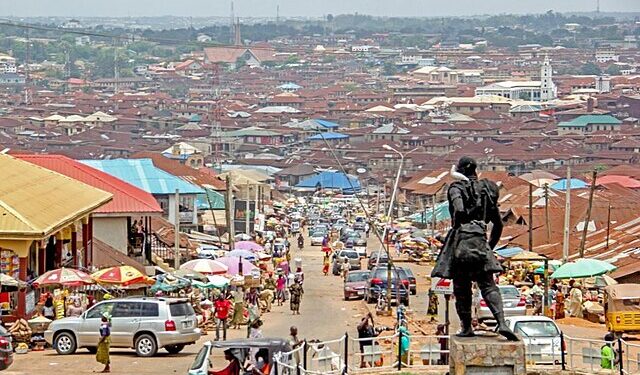
Nestled within the bustling streets of Nigeria’s ancient city of Ibadan lies the historic Oje Market, a trading hub that has stood the test of time since its establishment in the late 19th century. According to the Gbonka of Ibadan, the market’s origins can be traced back to the reign of Oba Oluyole in 1884.
The name “Oje” is derived from a town not far from Ijeru, near Ilorin, where many people had settled in the 1800s. However, when war broke out with the Fulani, the inhabitants were scattered, leading them to migrate to Ibadan.
“In order to know where these people should stay, they consulted an oracle, which instructed their leader to put all their sacrificial materials in a mortar and continue going round Ibadan Town until he was tired,” the Gbonka recounted. “When the leader could no longer carry the heavy load of the mortar and its contents, he stopped at Idi Ayunre. They continued and got to a place where they cleared the bush and saw cowry shells, lead, and tubers of yam, among other things. Shocked to have discovered the lead, which reminded them of their roots in Oje, near Ijeru, they named the place after their former home.”
Over the years, Oje Market has evolved into a thriving hub for the trade of Yoruba-made textiles, particularly the hand-woven “Aso Ofi” cloth. The market has become a meeting point for business transactions, not only for Yoruba-speaking people but also for traders from neighboring countries such as Cotonou, Togo, and Ghana.
“The Oyo, Ilorin, Iseyin, Ogbomoso, Iwo, Offa-Ile and other Yoruba-speaking people later were coming down here to sell their hand-woven clothes,” the Gbonka explained. “The market then became a meeting point for business transactions of native Yoruba clothings not only in Yoruba land but in Africa as a whole as traders come from Cotoneo, Togo, Ghana, among others.”
Today, Oje Market remains a vibrant and integral part of Ibadan’s cultural and economic landscape, serving as a testament to the city’s rich history and the enduring spirit of its people. As the market continues to evolve, it stands as a symbol of the resilience and adaptability of Ibadan’s trading traditions.











